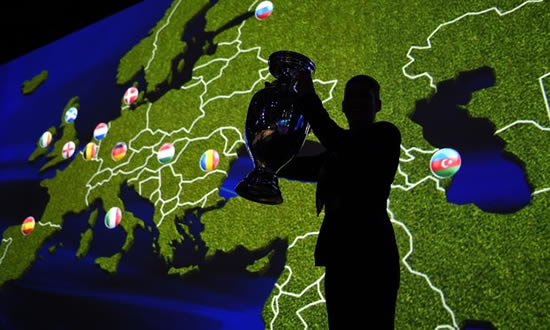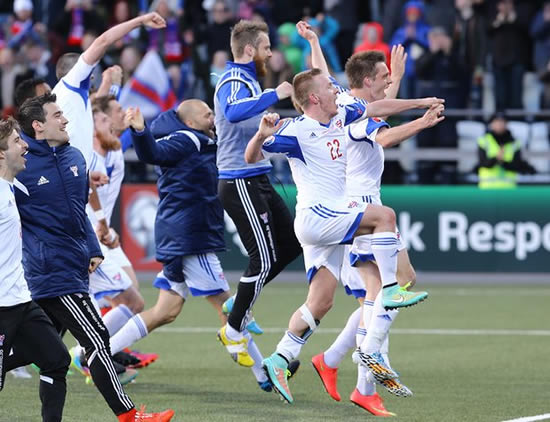Euro 2020: get ready for games from Bilbao to Baku and more minnows
Wednesday, July 13, 2016 Source: theguardian.com
Here comes Euro 2020, looming on the horizon.
Like all tournaments, it feels suddenly over far too soon. Euro 2016 isn’t going to go down as a classic overall, but it had the incredible stories of Wales and Iceland, some brilliant goals, and the most ridiculous penalty shootout you are ever likely to see between two of the heavyweights of the international game.
And there won’t be another tournament like it for eight years. Next time we get together to crown the champions of Europe, it will be in an experimental multi-city format, stretching across the continent, with London’s Wembley hosting the semi-finals and final.
If you were lucky enough to get to France during Euro 2016, you will know that in cities such as Lille, Lyon and Saint-Étienne, the second you stepped off the train you knew you were in the middle of a nation hosting a tournament.
Uefa will surely pull out all the usual branding and marketing tricks, and there will be banners and fanzones and only one type of low alcohol beer available, just as we found in France. But with games spread from Baku and St Petersburg in the east, to Dublin and Bilbao in the west, it will be much harder to give the tournament that feel of a unified nation partying while it is having a football festival.
Euro 2016: a bloated tournament where dour defence eclipsed the fairytales
But it’s not just the finals tournament of Euro 2020 that will feel completely different. Uefa is also planning significant changes to the way qualifying works, with the introduction of the Uefa Nations League tournament from 2018.
Intended as a means of replacing friendlies with competitive fixtures, it will involve each country in Europe being placed into one of four leagues (A to D), based on Uefa’s national country rankings. Those leagues will then be subdivided into four groups of three or four teams, and between September 2018 and November 2018 the teams in those groups will play each other home and away.
The top teams in each group in League A will go on to play for the Uefa Nations League trophy in a mini-tournament in summer 2019. There is promotion and relegation between the leagues based on finishing top or bottom of your group.
Euro 2020 qualifying will then get under way in March 2019. There will be 10 qualifying groups, and the top two sides in each group will go through to the finals. The qualifying will be wrapped up by November 2019.
The eagle-eyed among you will spot that this will generate 20 teams - four short of the number required for the finals, which for 2020 has no host nation automatically qualifying.
That’s where the Uefa Nations League comes back into play. In each league, the four best-placed teams who haven’t yet qualified for the finals get another shot, via a play-off system. These matches are proposed for March 2020. There are going to be three main effects of this.
Another safety net for the bigger nations
Under the new system, countries in Uefa’s top 20 nations such as Holland, Denmark or Bosnia and Herzegovina who missed out on Euro 2016 would almost certainly end up being among the highest-placed teams in League A or League B yet to qualify for the finals. The play-offs involve a one-off semi-final and one-off final match, with the winner progressing to Euro 2020.
One can understand Uefa’s desire to have its strongest teams and biggest TV rights markets represented at the tournament but can’t help feeling that progressive changes to the Euros since Euro 2012 have been about virtually ensuring that big teams simply cannot fail to reach the finals.

Faroe Islands, here celebrating a Euro 2016 qualifying victory over Greece in June 2015, will have their best-ever chance of making a European Championship final under the new format.
A guaranteed spot at Euro 2020 for one of Uefa’s weakest nations
As well as ensuring that the big teams won’t miss out, the new system will also ensure that a couple of Uefa’s least competitive nations do make it in. One team from League C and one from League D will also be guaranteed to progress to Euro 2020 via the play-off system.
In the case of League D, under the current rankings, that would mean one of Finland, Cyprus, Azerbaijan, Moldova, Belarus, Latvia, Georgia, Macedonia, Faroe Islands, Liechtenstein, Luxembourg, Kazakhstan, Malta, Andorra, San Marino or Gibraltar being at the finals.
Yes, there’s always the chance of a fairytale success like Iceland or Wales. But let’s be clear – those two sides did brilliantly, but before the tournament they were ranked 22nd and 25th in Europe by Uefa. The League D teams occupy places 39 to 54.
The Nations League makes a lot of sense for these teams, giving them competitive matches against sides of similar quality, rather than them being endlessly set up as the whipping boys of the qualifying process.
But it does risk unbalancing the Euro 2020 tournament. In a situation where four best-placed third teams qualify from the group stage, there would be a considerable advantage to being drawn in the group that has one of the teams that Uefa usually considers the lowest-seeded teams for qualifying games. It might be great for a nation such as Kazakhstan or San Marino to experience being at a finals. It might be even better to be one of the teams drawn in their group.
A more complicated journey for fans
The format of the finals will also pose incredible logistical problems for fans. If you are following a team who get all the way to the final, you may end up having to visit four or five countries along the way. Depending on how the group fixtures are arranged, you will probably end up having to visit at least two different countries just to see your country’s three opening matches.
And you will have less time to plan it. For Euro 2016, the play-offs to determine the last qualifiers were in November 2015, meaning the draw could be done before Christmas, giving fans six months to plan their expeditions to France. The final lineup for Euro 2020 won’t be known until three months before the opening game is due to kick off.
Euro 2020 qualifying timeline
- September-November 2018: Uefa Nations League group matches
- March 2019-June 2019: Euro 2020 qualifying matches
- June 2019: Uefa Nations League finals tournament
- September-November 2019: Euro 2020 qualifying matches continue
- March 2020: Uefa Nations League play-offs (with Euro 2020 places for winners)
Holland failed to qualify for Euro 2016 but the system for the next Euros makes it far less likely that a country of that stature will miss out.
Uefa Nations League possible groupings
Based on the 2016 Uefa national rankings, the four divisions of the Uefa Nations League would currently look like:
League A: Belgium, Croatia, England, France, Germany, Italy, Holland, Portugal, Slovakia, Spain, Switzerland, Ukraine
League B: Austria, Bosnia and Herzegovina, Czech Republic, Denmark, Greece, Hungary, Iceland, Poland, Republic of Ireland, Romania, Russia, Sweden
League C: Albania, Armenia, Bulgaria, Estonia, Israel, Lithuania, Montenegro, Northern Ireland, Norway, Scotland, Serbia, Slovenia, Turkey, Wales
League D: Andorra, Azerbaijan, Belarus, Cyprus, Faroe Islands, Finland, Georgia, Gibraltar, Kazakhstan, Latvia, Liechtenstein, Luxembourg, Macedonia, Malta, Moldova, San Marino
Expanding the European Championship competition and hosting matches in places that have never featured in tournament finals before, such as Budapest, Bucharest and Copenhagen, fulfils the former Uefa president Michel Platini’s ambition of expanding access to football beyond the bigger nations. But you can’t help thinking that by the end of Euro 2020, after watching a 51-match tournament spread across 13 countries, we’ll be feeling nostalgic for the simpler times of a 16-team European Championship tournament hosted by one nation.
| Ranking | Player | Country | GS (PEN) |
- Year
- Winners
- Runner-up







